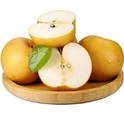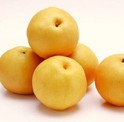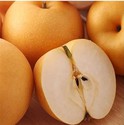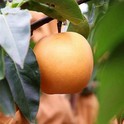Hey there! As a fragrant pear supplier, I often get asked all sorts of questions about these delicious fruits. One question that pops up quite a bit is, "Do fragrant pears have a lot of fiber?" Well, let's dig into that and find out.
First off, let's talk a bit about what fiber is and why it's important. Fiber is a type of carbohydrate that our bodies can't digest. It plays a crucial role in our digestive health. It helps keep things moving smoothly in our gut, prevents constipation, and can even lower the risk of heart disease and diabetes. There are two types of fiber: soluble and insoluble. Soluble fiber dissolves in water and forms a gel-like substance in our intestines, which can help lower cholesterol and blood sugar levels. Insoluble fiber, on the other hand, adds bulk to our stool and helps it pass through our digestive system more easily.


Now, let's get to the main question: do fragrant pears have a lot of fiber? The answer is yes! Fragrant pears are a great source of dietary fiber. A medium-sized fragrant pear, which is about 166 grams, contains around 5.5 grams of fiber. That's about 22% of the recommended daily intake for adults.
Most of the fiber in fragrant pears is insoluble fiber. This is really good news for our digestive system. The insoluble fiber in fragrant pears acts like a broom, sweeping through our intestines and keeping them clean. It can help prevent digestive problems like constipation and irritable bowel syndrome.
But that's not all. Fragrant pears also contain a fair amount of soluble fiber. The soluble fiber in these pears can help lower cholesterol levels by binding to cholesterol in our intestines and preventing it from being absorbed into our bloodstream. It can also help regulate blood sugar levels by slowing down the absorption of sugar from our food.
Another great thing about fragrant pears is that they're low in calories. A medium-sized fragrant pear only has about 100 calories. So, if you're trying to watch your weight, you can enjoy a fragrant pear as a healthy snack without worrying about packing on the pounds.
Fragrant pears are also rich in vitamins and minerals. They're a good source of vitamin C, which is an antioxidant that helps boost our immune system and protect our cells from damage. They also contain potassium, which is important for maintaining healthy blood pressure and proper heart function.
Now, let's talk about some of the different varieties of fragrant pears. There are several types of fragrant pears out there, each with its own unique flavor and texture. One popular variety is the Beautiful Pear Tree Fruit. These pears are known for their sweet and juicy flavor. They have a smooth, thin skin and a firm, crisp texture.
Another great variety is the Qiuyue Asian Pear. These pears are native to Asia and are known for their crunchy texture and sweet, refreshing flavor. They're often eaten fresh, but they can also be used in cooking and baking.
And then there are the Hosui Asian Pears. These pears are large and round, with a golden-brown skin. They have a sweet, juicy flavor and a soft, buttery texture. They're great for eating fresh, but they can also be used in salads, desserts, and even savory dishes.
So, as you can see, fragrant pears are not only delicious but also incredibly healthy. They're a great source of fiber, vitamins, and minerals, and they're low in calories. Whether you're looking for a healthy snack or a way to add some flavor and nutrition to your meals, fragrant pears are a great choice.
If you're interested in purchasing fragrant pears for your business or personal use, I'd love to chat with you. I'm a reliable fragrant pear supplier, and I can offer you high-quality pears at competitive prices. Just reach out, and we can start the conversation about your needs.
References
- U.S. Department of Agriculture, Agricultural Research Service. "FoodData Central."
- Harvard T.H. Chan School of Public Health. "The Nutrition Source - Fiber."






